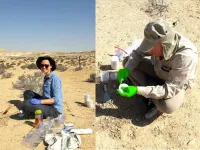(Press-News.org) A comparison of treatments for malnutrition enteropathy, caused by severe acute malnutrition (SAM), has found evidence supporting the use of treatments to enhance the healing of mucosal membranes and reduce inflammation in the gut to improve the outcomes of children affected by long-team health consequences of a period of malnutrition.
The Therapeutic Approaches to Malnutrition Enteropathy (TAME), led by researchers from Queen Mary University of London, evaluated four interventions for malnutrition enteropathy in a multi-centre phase II multi-arm trial in Zambia and Zimbabwe. No interventions for malnutrition enteropathy are currently available. The research gathered the first evidence in three decades which confirmed that treating malnutrition enteropathy can reduce intestinal damage amongst children experiencing the effects of complicated SAM.
The study of 125 children who had been hospitalised due to complications arising from SAM found a biologically plausible new treatment paradigm, where intestinal damage drives systemic inflammation, contributing to stunting and developmental impairment, and increasing mortality. Researchers identified that a short course of treatment to restore mucosal integrity in the gut, can ameliorate underlying pathogenic pathways when added to standard care.
Researchers found that GLP-2 agonists such as Teduglutide enhances mucosal healing in children with SAM. None of the other interventions studied showed any significantly differences compared to standard care, however budesonide was also shown to reduce the systemic inflammatory marker C-reactive protein (CRP), which is a predictor of infant mortality. Bovine colostrum and N-acetyl glucosamine also reduced inflammation; in addition, colostrum increased mucosal regeneration and N- acetyl glucosamine reduced diarrhoea. Further clinical trials are needed, but the TAME trial demonstrates that both treatments are likely to be safe, and confirms mucosal healing as a promising strategy in severe malnutrition.
Paul Kelly, Professor of Tropical Gastroenterology at Queen Mary University of London, said: ‘Severe Acute Malnutrition (SAM) carries unacceptable mortality, particularly if accompanied by infection or medical complications, including enteropathy. We have shown that a short course of therapy added to standard care, aimed at restoring mucosal integrity, can reduce these complications, and we look forward to examining these treatments further in phase III clinical trials.’
Dr Jess Boname, Acting Head of Population and Systems Medicine at the Medical Research Council, said: “This study was funded by the Medical Research Council to address the tragedy that nearly half of deaths among children under five worldwide are linked to undernutrition. While the UK and many developing countries are suffering from an obesity crisis, undernutrition still causes a high death rate in children under five, mostly in low- and middle-income countries. We hope that this study will lead to effective treatments that will improve the health and wellbeing of children suffering from acute malnutrition and provide lasting benefits for the whole community.”
Each year 17 million children, mostly in Africa, experience SAM, and malnutrition underlies almost half of all child deaths globally. Studies have confirmed the very high frequency of in resource poor countries and an association between such gut inflammation and mortality in complicated SAM.
NOTES TO EDITORS
Peer-reviewed | Randomised Controlled Trial | People
Contact:
Honey Lucas
Faculty Communications Officer – Medicine and Dentistry
Queen Mary University of London
Email: h.lucas@qmul.ac.uk or press@qmul.ac.uk
Paper details:
M.P. Kelly et al. “Malnutrition enteropathy in Zambian and Zimbabwean children with severe acute malnutrition: A multi-arm randomized phase II trial.” Published in Nature Communications.
DOI: 10.1038/s41467-024-45528-0
Available after publication at: https://www.nature.com/articles/s41467-024-45528-0
Under strict embargo until 10am UK time Wednesday 17 April 2024.
A copy of the paper is available upon request.
Funding information:
Medical Research Council (MR/P024033/1).
Takeda UK provided tedu-glutide at a discounted price.
Conflicts of Interest Disclosures: Raymond J. Playford was previously an external consultant to Colostrum UK which provided the bovine colostrum used in these studies. Raymond J. Playford has also been an external consultant to Sterling Technology (USA) and an employee of Pantheryx Inc (USA) who produce and distribute bovine colostrum. There was no bovine colostrum company involvement in the production of this article or editing of its content. Susan Hill has had funding for teduglutide studies and lectured and participated in advisory boards on behalf of Takeda. The remaining authors declare no competing interests.
About Queen Mary
www.qmul.ac.uk
At Queen Mary University of London, we believe that a diversity of ideas helps us achieve the previously unthinkable.
Throughout our history, we’ve fostered social justice and improved lives through academic excellence. And we continue to live and breathe this spirit today, not because it’s simply ‘the right thing to do’ but for what it helps us achieve and the intellectual brilliance it delivers.
Our reformer heritage informs our conviction that great ideas can and should come from anywhere. It’s an approach that has brought results across the globe, from the communities of east London to the favelas of Rio de Janeiro.
We continue to embrace diversity of thought and opinion in everything we do, in the belief that when views collide, disciplines interact, and perspectives intersect, truly original thought takes form.
About the Medical Research Council
The Medical Research Council (MRC) is at the forefront of scientific discovery to improve human health. Founded in 1913 to tackle tuberculosis, the MRC now invests taxpayers’ money in some of the best medical research in the world across every area of health. Thirty-three MRC-funded researchers have won Nobel prizes in a wide range of disciplines, and MRC scientists have been behind such diverse discoveries as vitamins, the structure of DNA and the link between smoking and cancer, as well as achievements such as pioneering the use of randomised controlled trials, the invention of MRI scanning, and the development of a group of antibodies used in the making of some of the most successful drugs ever developed. Today, MRC-funded scientists tackle some of the greatest health problems facing humanity in the 21st century, from the rising tide of chronic diseases associated with ageing to the threats posed by rapidly mutating micro-organisms. The Medical Research Council is part of UK Research and Innovation. https://mrc.ukri.org/
END
First new analysis in three decades identifies which treatments for the long-term effects of malnutrition could help reduce mortality and poor health outcomes for children
2024-04-17
ELSE PRESS RELEASES FROM THIS DATE:
AI speeds up drug design for Parkinson’s by ten-fold
2024-04-17
Researchers have used artificial intelligence techniques to massively accelerate the search for Parkinson’s disease treatments.
The researchers, from the University of Cambridge, designed and used an AI-based strategy to identify compounds that block the clumping, or aggregation, of alpha-synuclein, the protein that characterises Parkinson’s.
The team used machine learning techniques to quickly screen a chemical library containing millions of entries, and identified five highly potent compounds for further investigation.
Parkinson’s affects more than six million people worldwide, with that number projected to triple by 2040. ...
Older adults with diabetes experienced functional decline during the COVID-19 pandemic
2024-04-17
Toronto, ON —Researchers found that approximately 1 in 5 older Canadian adults with diabetes and no pre-pandemic functional limitations developed functional limitations for the first time during the COVID-19 pandemic. Functional limitations refer to difficulties with basic mobility-related tasks, such as walking two to three blocks, standing up from a chair, or climbing stairs. In comparison, only one in eight of their peers without diabetes developed functional limitations during the ...
How soil microbes survive in harsh desert environments
2024-04-17
Prolonged droughts followed by sudden bursts of rainfall – how do desert soil bacteria manage to survive such harsh conditions? This long-debated question has now been answered by an ERC project led by microbiologist Dagmar Woebken from the Centre for Microbiology and Environmental Systems Science (CeMESS) at the University of Vienna. The study reveals that desert soil bacteria are highly adapted to survive the rapid environmental changes experienced with each rainfall event. These findings were recently published in the prestigious ...
Toronto researchers uncover human DNA repair by nuclear metamorphosis
2024-04-17
Researchers at the University of Toronto have discovered a DNA repair mechanism that advances understanding of how human cells stay healthy, and which could lead to new treatments for cancer and premature aging.
The study, published in the journal Nature Structural and Molecular Biology, also sheds light on the mechanism of action of some existing chemotherapy drugs.
“We think this research solves the mystery of how DNA double-strand breaks and the nuclear envelope connect for ...
Fluctuating coffee prices put mental pressure on Vietnamese farmers
2024-04-17
While your invigorating morning coffee may become cheaper when there are large fluctuations in the world market price, they are a major additional psychological burden for the farmers who grow the coffee.
This is documented in a new international study on the effect of income uncertainty on the mental health of Vietnamese coffee farmers.
"Our results suggest that not only poverty, but also the risk of poverty caused by fluctuating prices has a significant additional negative effect on the mental well-being of farmers in low-income countries," says Finn ...
Silver-based micromotors that eliminate bacteria moving freely in aqueous media
2024-04-17
In ancient Greece, over 3000 years ago, wise men used silver salts to prevent wounds from becoming infected. These salts continued to be used until Alexander Fleming discovered the first antibiotic "just" 100 years ago. The use of antibiotics represented a major breakthrough in the treatment of infectious diseases, but resistance soon began to emerge. Bacteria, which have been on the planet longer than us, have found ways to overcome different antibiotics, and today antibiotic resistance is a major global health problem.
In times when everything evolves ...
New research shows urgency to act on Nigeria’s trans fat elimination policy
2024-04-17
Significantly reducing trans fat levels in the Nigerian food supply could prevent approximately 10,000 heart disease deaths and save 90 million USD (12 billion Naira, ₦) in healthcare costs over a decade. New findings by The George Institute for Global Health on the health and economic benefits of enacting the country’s trans fat elimination policy were published today in BMJ Global Health.
In 2023, Nigeria followed South Africa as only the second African country to adopt a best practice trans fat ...
Healthy diet lowers heart disease risk in breast cancer survivors
2024-04-17
A new paper in JNCI Cancer Spectrum, published by Oxford University Press, finds that following a healthy diet lowers the risk of cardiovascular disease in breast cancer survivors.
Cardiovascular disease is the top non-breast cancer related cause of death in women with breast cancer. There are more than 3.8 million female breast cancer survivors in the United States. These women are at higher risk for cardiovascular disease than women who have not had breast cancer. This is likely due to the cardiotoxic effects of breast cancer treatment, as well as common risk factors for both breast cancer and cardiovascular disease, such as aging, lack of exercise, ...
From defects to order: Spontaneously emerging crystal arrangements in perovskite halides
2024-04-17
Perovskites are among the most extensively studied materials in modern materials science. Their often unique and exotic properties, which stem from perovskite’s peculiar crystal structure, could find revolutionary applications in various cutting-edge fields. One intriguing way of realizing such properties is through the precise ordering of a perovskite’s defects, such as vacancies or substitutions.
In oxide chemistry, scientists have known for a long time that oxide defects can spontaneously and consistently arrange themselves throughout the crystal lattice, once they reach certain concentrations (e.g. integer ratio). This emerging ...
Responsible AI could contribute to global peace, experts suggest
2024-04-17
Artificial intelligence (AI) could be a vital tool to promote peace, prevent violent conflict, and safeguard human rights – if used responsibly, experts say.
Much focus has been on AI’s potential for catastrophic harm from powering drone swarms for international warfare to generating deep fakes which spread misinformation and prejudice.
But authors Branka Panic and Dr Paige Arthur say AI-driven technology should also be seen as a potential force for good in conflict-torn countries to ‘wage peace’.
With the ongoing wars in Ukraine and Gaza and three decades on from the Rwandan genocide, their book AI for Peace highlights concrete ways that AI tools are being used to ...



